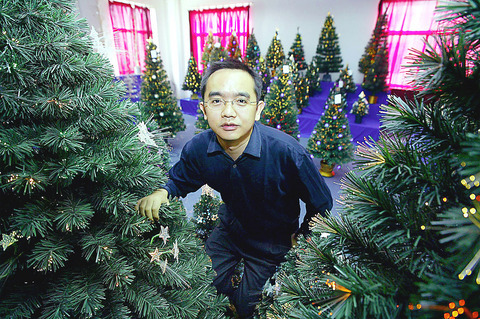Father Christmas's grotto is not an icy cave in Lapland but the economic heart of southern China, where almost two-thirds of the world's Christmas trees and decorations are made.
In factories staffed by predominantly Buddhist workers who have scarcely any idea of the meaning of Christmas, the baubles, Santas, lights and tinsel that mark the West's biggest festival are churned out at a relentless pace.

PHOTO: AFP
"No one would dispute it if you said China is the biggest manufacturer of Christmas products. Even its customs department has figures just for exports of these goods," said Paul French, publishing and marketing director of Access Asia, a market research company with a special focus on China.
According to Customs figures, China exported US$1.6 billion worth of Christmas products last year, of which more than half went to the US, including seven artificial trees erected in the White House.
China's export of Christmas-related goods in the first nine months of this year amounted to US$850 million.
More than half of that -- US$510 million worth -- came from Guangdong Province.
In the US alone, unless your family purchased a natural tree, you would have had a 70 percent chance of celebrating your Christmas with an artificial tree manu-factured in Guangdong's Shenzhen City.
Shenzhen SG Handicraft Co is one of more than 300 enterprises that produces Christmas items.
Chairman William Cheng said 80 percent of the company's sales came from Christmas trees. His company makes 400,000 artificial trees a year that are exported to major supermarkets and department stores in the US and the UK.
"We are full of factories of this kind in Shenzhen," said Cheng from his factory, now in a lull after the pre-Christmas rush.
"There is so much competition out there. A lot of our customers want high quality, new products. To attract more foreign investors, we make more fibre-optic trees, trees with flashing stars, candles and so on. Our novelty trees are also quite popular."
Cheng's factory, an hour from Shenzhen City, is clean and brightly lit if a little unkempt.
At long workbenches, a few late-season workers tool the last of this year's orders.
Cheng said production usually started in February each year, after the Lunar New Year, with goods ready for delivery in October.
During the height of the production period, Cheng would have 600 workers producing different types of Christmas ornaments.
Starting his own business only three years ago, Cheng said one of the most difficult things about making Christmas decorations in a non-Christian country is to understand Western culture and meet its requirements.
"They have different perceptions of colors. They like white trees, which is supposed to be a funeral color here and doesn't seem appropriate in this happy season," he said.
Cheng's turnover this year has doubled to US$6 million, but he says rising prices for plastic, the raw material of Christmas, along with increasing salaries, are cutting into profits.
"I should start thinking about developing products for other Western festivals, like the Valentine's Day or Halloween," he said.

Right-wing political scientist Laura Fernandez on Sunday won Costa Rica’s presidential election by a landslide, after promising to crack down on rising violence linked to the cocaine trade. Fernandez’s nearest rival, economist Alvaro Ramos, conceded defeat as results showed the ruling party far exceeding the threshold of 40 percent needed to avoid a runoff. With 94 percent of polling stations counted, the political heir of outgoing Costa Rican President Rodrigo Chaves had captured 48.3 percent of the vote compared with Ramos’ 33.4 percent, the Supreme Electoral Tribunal said. As soon as the first results were announced, members of Fernandez’s Sovereign People’s Party

EMERGING FIELDS: The Chinese president said that the two countries would explore cooperation in green technology, the digital economy and artificial intelligence Chinese President Xi Jinping (習近平) yesterday called for an “equal and orderly multipolar world” in the face of “unilateral bullying,” in an apparent jab at the US. Xi was speaking during talks in Beijing with Uruguayan President Yamandu Orsi, the first South American leader to visit China since US special forces captured then-Venezuelan president Nicolas Maduro last month — an operation that Beijing condemned as a violation of sovereignty. Orsi follows a slew of leaders to have visited China seeking to boost ties with the world’s second-largest economy to hedge against US President Donald Trump’s increasingly unpredictable administration. “The international situation is fraught

MORE RESPONSIBILITY: Draftees would be expected to fight alongside professional soldiers, likely requiring the transformation of some training brigades into combat units The armed forces are to start incorporating new conscripts into combined arms brigades this year to enhance combat readiness, the Executive Yuan’s latest policy report said. The new policy would affect Taiwanese men entering the military for their compulsory service, which was extended to one year under reforms by then-president Tsai Ing-wen (蔡英文) in 2022. The conscripts would be trained to operate machine guns, uncrewed aerial vehicles, anti-tank guided missile launchers and Stinger air defense systems, the report said, adding that the basic training would be lengthened to eight weeks. After basic training, conscripts would be sorted into infantry battalions that would take

GROWING AMBITIONS: The scale and tempo of the operations show that the Strait has become the core theater for China to expand its security interests, the report said Chinese military aircraft incursions around Taiwan have surged nearly 15-fold over the past five years, according to a report released yesterday by the Democratic Progressive Party’s (DPP) Department of China Affairs. Sorties in the Taiwan Strait were previously irregular, totaling 380 in 2020, but have since evolved into routine operations, the report showed. “This demonstrates that the Taiwan Strait has become both the starting point and testing ground for Beijing’s expansionist ambitions,” it said. Driven by military expansionism, China is systematically pursuing actions aimed at altering the regional “status quo,” the department said, adding that Taiwan represents the most critical link in China’s